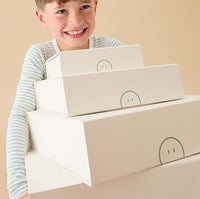She also strongly suggested avoiding gas-forming foods in the evening meal: foods such as cauliflower, broccoli and cabbage. All are of course a brilliant addition to the day’s meals, but not as the last meal of the day. Perhaps just as important as what foods we should avoid in the evenings, is what foods we should eat? Bianca recommends foods rich in tryptophan, an essential amino acid that acts as a mood regulator; it has the ability to help balance hormones naturally and has a natural calming effect upon the body. Where can you find tryptophan? It is present in most protein-based foods, or dietary proteins. So, to help I have written the following two recipes: which include ingredients which are good sources of tryptophan. One includes oats, which are a great source of soluble fibre and help little tummies stay fuller for longer. May these recipes bring you the sleep we all need and deserve!
Written by mum Miriam Cooper, in consultation with Bianca Parau, https://www.lavie-nutrition.com. For more information and recipes from Miriam, you can have a look at her website, Facebook or Twitter page!





